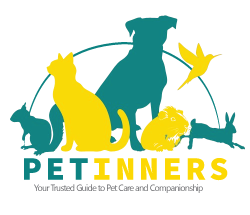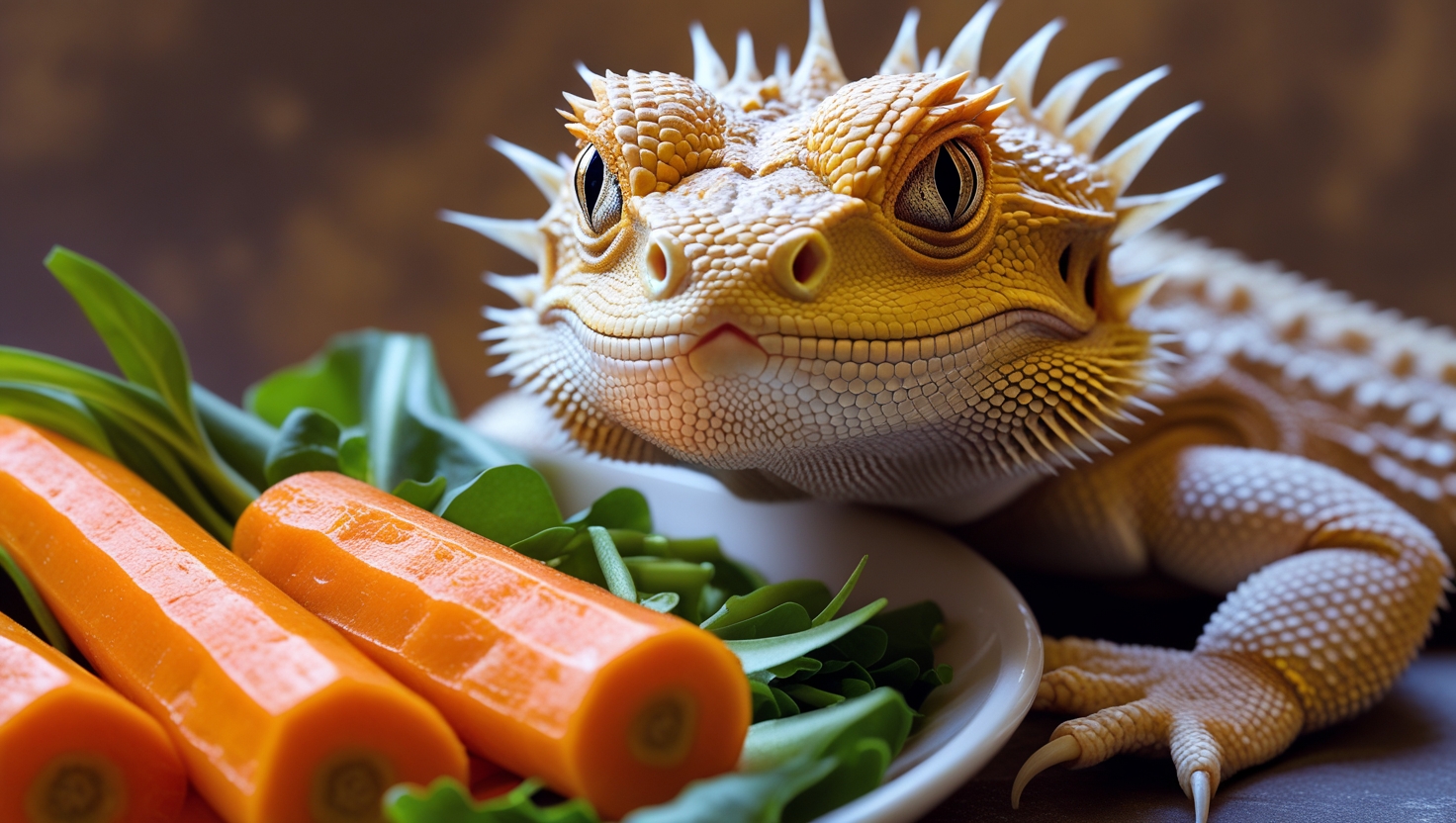Can Bearded Dragons Eat Carrots?
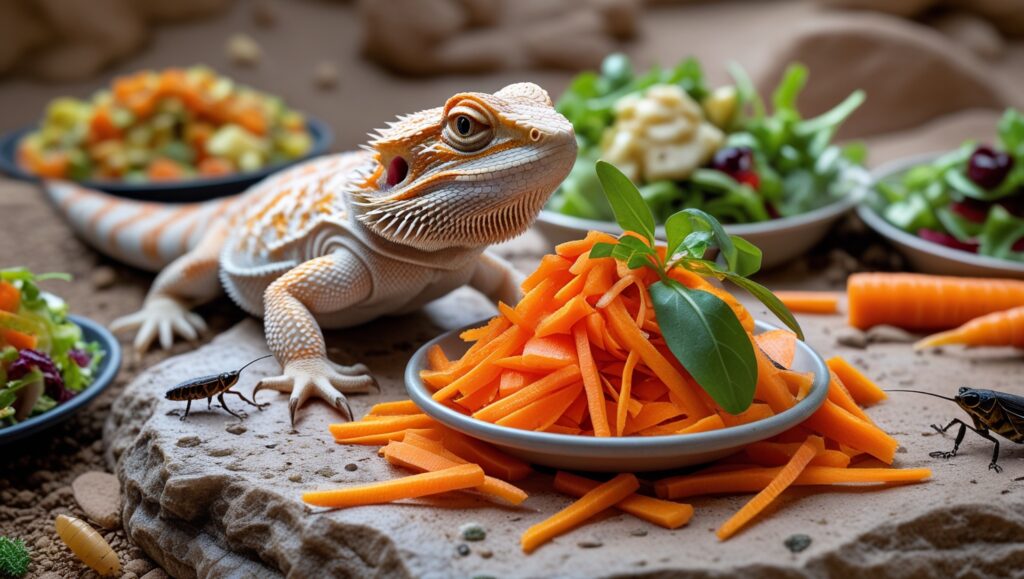
Yes, bearded dragons can eat carrots as an occasional treat. Carrots provide vitamin A, fiber, and other nutrients, but overfeeding can lead to toxicity and calcium imbalance. Serve them grated or chopped a few times a week.
General Information
Carrots are a healthy and colorful vegetable that can be safely given to bearded dragons. They are rich in beta-carotene, which supports vision and the immune system. While not part of their daily meals, carrots can be an occasional snack. The root portion provides essential fiber and antioxidants, though pet owners must ensure balance to prevent excess vitamin A intake, which can affect bearded dragon care.
You can offer hydrated carrot greens as a garnish in salads, meeting your beardie’s dietary needs. However, keep an eye on the calcium to phosphorus ratio to avoid health issues. When following proper instructions and understanding your reptilian friend’s diet, you’ll be able to meet their dietary needs in a healthier way. A comprehensive guide is key for those wanting to incorporate carrots while ensuring variety in their pet’s diet.
Are Carrots a Good Choice?
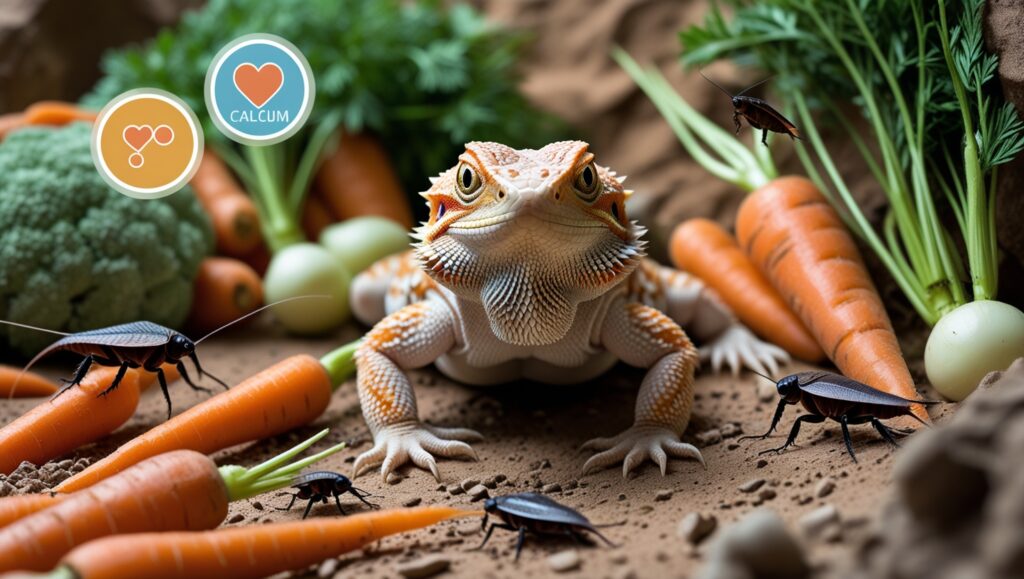
In their natural habitat, like the Australian deserts, bearded dragons eat a variety of insects and plants. Carrots, while not a staple vegetable, can be part of their menu in moderation. The nutritional benefits include beta carotene and vitamin A, which support healthy skin, vision, and the immune system. However, excessive vitamin A may lead to toxicity, making your beardie susceptible to health issues.
Carrots are low in calcium and higher in phosphorus, which can disrupt bone development and wellness by affecting the bloodstream’s mineral balance. Overfeeding phosphorus-rich foods may increase the risk of metabolic bone disease (MBD), a dangerous condition impacting the bone structure. Ensure your dragon gets sufficient calcium from other sources to prevent MBD.
It’s best to offer carrots 1-2 times a week instead of every day. You can mix them with insects like Dubia roaches, which provide vital exoskeleton nutrients, or balance them with greens. Regular fiber from carrots also aids digestion while keeping your beardie active and healthy. Proper feeding habits will support long-term wellness.
Nutrition and Health
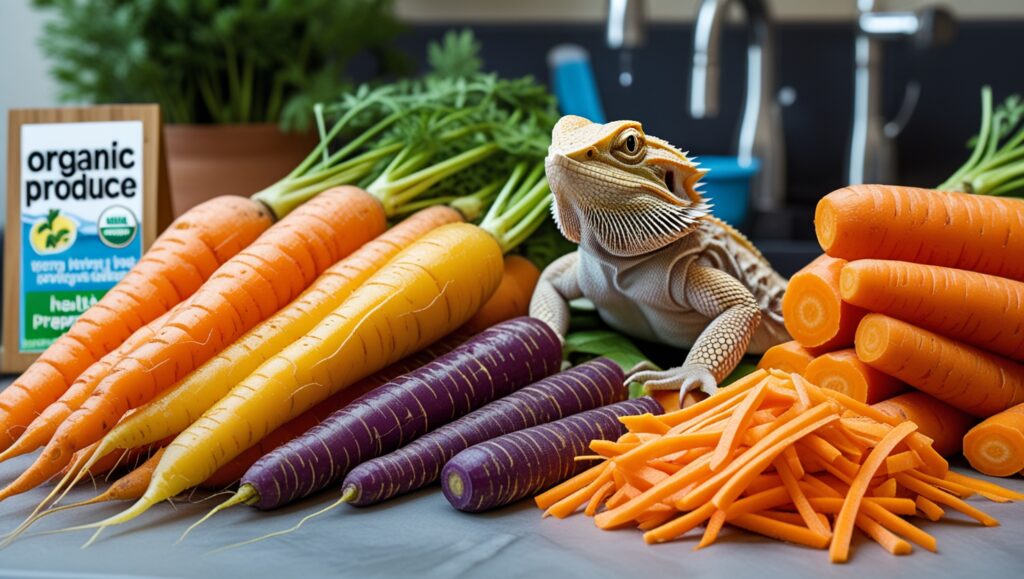
Nutritional Value of Carrots
Carrots can be part of a bearded dragon’s diet, but understanding their nutritional value and risks is essential.
Nutritional Value of Carrots for Bearded Dragons
- Calories: 41 cal (per 100g serving)
- Water Content: 88.29g
- Carbohydrates: 9.58g
- Sugars: 4.74g
- Fat: 0.24g
- Proteins: 0.93g
- Calcium (Ca): 33mg
- Phosphorus (P): 35mg
- Ca:P Ratio: 0.9:1
- Vitamin A: 16,706 IU
- Vitamin C: 5.9mg
- Sodium: 69mg
- Oxalates: Low
- pH Level: 6.1
Feeding Guidelines
- Frequency: Feed 2-3 times/week
- Benefits:
- Vitamin A improves healthy skin, vision, and immune function
- Fiber aids digestion
- High water content helps with hydration
- Risks:
- Too much may cause vitamin A toxicity (symptoms: decreased energy, swelling, weight loss)
- Imbalanced Ca:P ratio; use calcium powder for optimal bone health
Potential Health Issues
Carrots provide vitamin A, which supports healthy skin, good vision, and a strong immune system. However, if your beardie eats significant amounts or takes beta carotene supplements, they risk hypervitaminosis A. Symptoms of toxicity include swelling, weight loss, decrease in energy, and dehydration. If these appear, contact a vet immediately.
The calcium to phosphorus ratio in carrots is unbalanced. Too much phosphorus can block calcium, causing long-term health issues. For optimal mineral balance, avoid making carrots a primary food source.
Beardies, being omnivores, thrive on a mixed diet of plants and feeder insects like dubia roaches and crickets. While baby bearded dragons need a higher proportion of insects to meet their protein needs, adult bearded dragons can have more plant-based foods. Carrots can be safely included in their diet to meet dietary requirements.
Carrot Varieties and Suitability
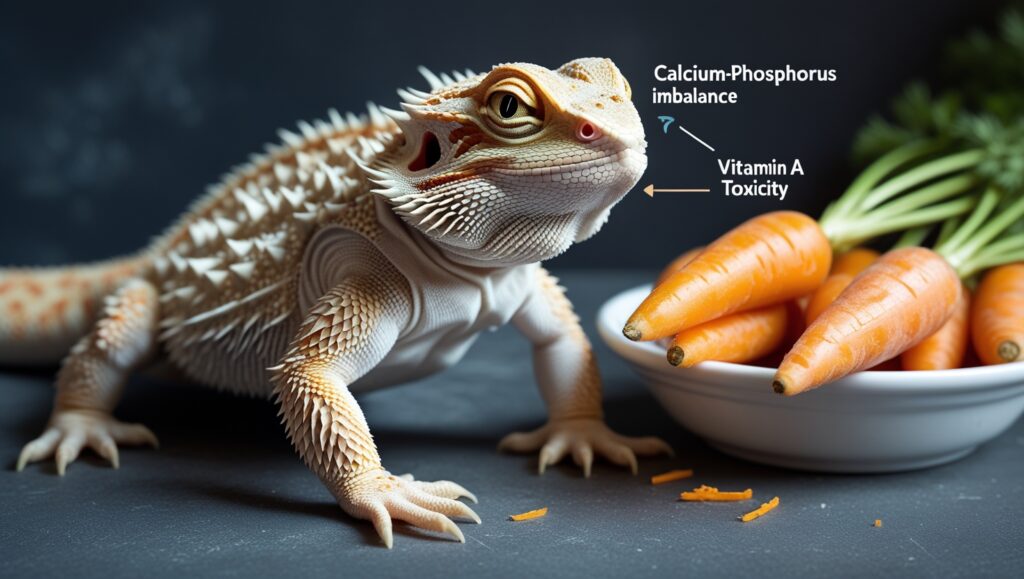
Carrots come in different colors, including orange carrots, purple carrots, and yellow. Bearded dragon owners can feed their pets raw or steamed carrots, but avoid processed baby carrots that may have chlorine washes or harmful preservatives. Always use washed, organic, and fresh carrots to retain nutrients.
Carrot varieties like mature carrots provide better nutritional properties and vitamin A than baby carrots, which lose nutritional content during processing (e.g., cutting, peeling, and polishing). Carrot tops are also safe in moderation but should be clean and undamaged.
When preparing carrots for your dragon, check for broken or damaged pieces. Including carrots of different colors can enhance the menu with variety, supporting your pet’s overall health. Always exercise caution by skipping over-processed or poorly stored options.
Feeding Carrots to Bearded Dragons
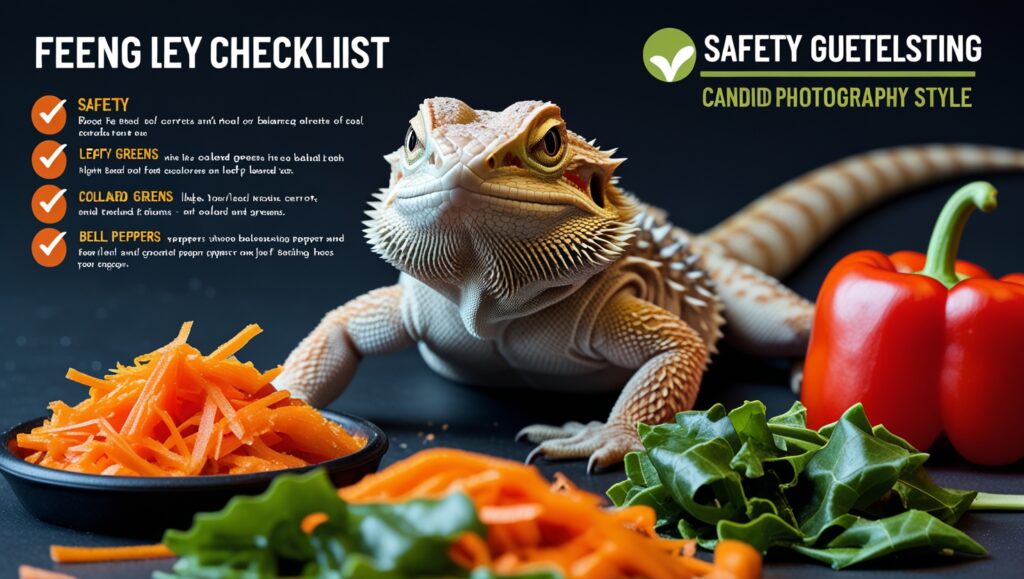
Preparing Carrots for Bearded Dragons
Raw carrots are safe if prepared correctly. Wash them with water and a vegetable brush to remove loose dirt, debris, and chemicals from store handling and transportation. Avoid feeding hard pieces that may be a choking hazard.
Use a cheese grater or vegetable grate to create loose shreds, manageable shavings, or tiny pieces. You can also chop carrots into small pieces for easy eating. Mixing carrot shavings with other foods high in calcium can improve your beardie’s diet.
Feed carrots a few times per week, keeping the portion right for their age and needs. Proper preparation ensures your dragon stays safe and avoids major health risks.
Feeding Safety and Guidelines
Carrots, including orange, white, yellow, and purple varieties, are nutritionally similar and safe for your beardie if fed in moderation. Follow these safety guidelines for proper feeding:
-
Preparation:
- Wash carrots to remove dirt, pesticides, and harmful chemicals.
- Avoid whole large carrots and processed baby carrots with preservatives.
-
Feeding Methods:
- Grate, chop, or slice carrots into small pieces to prevent choking risk.
- Carrot tops are nutrient-rich but should be offered sparingly due to oxalates affecting calcium absorption.
-
Health Considerations:
- Overfeeding carrots may lead to health issues like metabolic bone disease (MBD) or kidney stones.
- Use a calcium supplement to maintain balance and prevent deficiencies.
-
Balanced Diet:
- Offer carrots once a month along with a variety of other foods:
- Leafy greens: collard greens, mustard greens, dandelion greens.
- Veggies: bell peppers, butternut squash, sweet potato.
- Enhance meals with fresh herbs like cilantro for added flavor and appeal.
- Offer carrots once a month along with a variety of other foods:
-
Supplements:
- Include a reptile multivitamin and calcium supplement to ensure proper nutrients, potassium, and minerals, promoting comprehensive long-term health.
Special Considerations
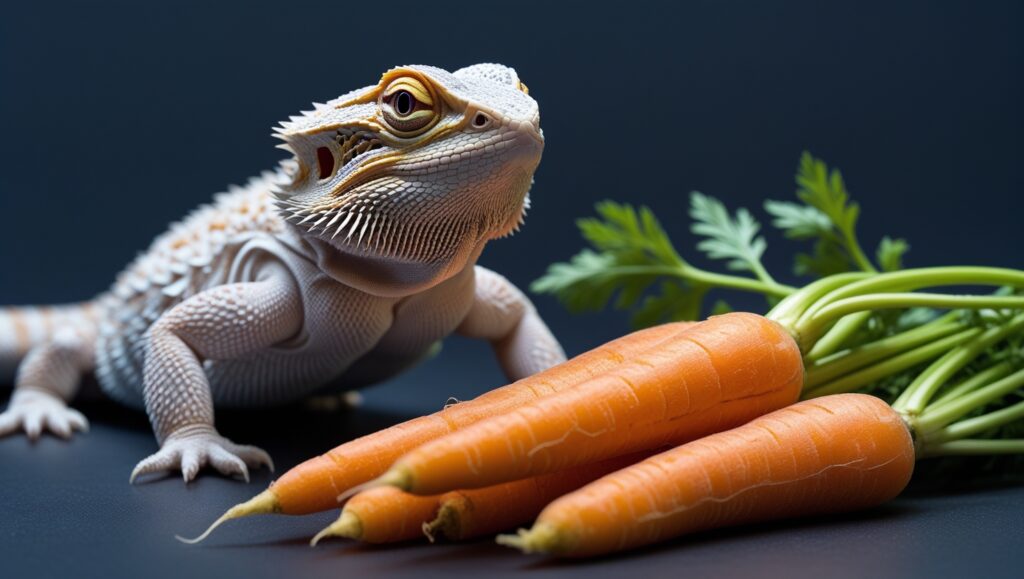
Carrot tops contain oxalates that block calcium from being absorbed into the bloodstream, increasing the risk of MBD and kidney stones in bearded dragons. For safety, feed carrots as an occasional treat, about once a month.
High phosphorus content can also harm your beardie’s kidneys. Carrots are safe only when part of a balanced diet. Prioritize low-oxalate foods to maintain healthy calcium levels.
Final Thoughts
Carrots are nutritious and can be part of a balanced diet for reptiles like bearded dragons. When introduced carefully and in moderation, they provide valuable nutrients but may cause vitamin A overload or affect calcium content.
A well-planned diet supports your pet’s unique nutritional needs. For a healthy and vibrant beardie, make adjustments as needed and consult a veterinarian to reduce any risks associated with bearded dragon food.
Kindly note: The content shared in this blog is gathered from online sources, some of which may not be verified. For accurate guidance on caring for your Bearded dragons, it is recommended to seek advice from a qualified veterinarian.
